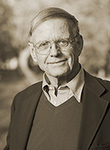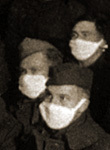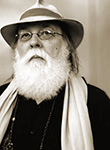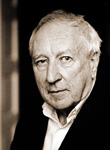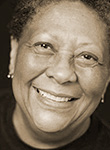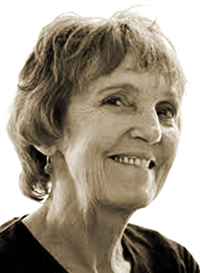Welcome to Blackbird’s In Previous Issues. Here we call your attention to work in our archives that for one reason or another has particular resonance against the work being newly published and/or the moment in which we are publishing. In addition, we will recognize work by old friends who are also current contributors and significant book-length material that we believe deserves steady and ongoing attention.
Since Blackbird published v19n1 we have been saddened by the loss of Myron Helfgott and Robert Richardson, long-time friends and generous contributors.
Myron Helfgott first appeared in Blackbird v1n2. Numerous other appearances culminated in a presentation from the comprehensive show of Helfgott’s art in 2015, which Blackbird featured in v14n1. The exhibition was organized by VCU’s Anderson Gallery. The show, which was titled “Myron Helfgott: An Inventory of My Thoughts,” presented more than fifty sculptures, works on paper, and multimedia installations. Blackbird’s presentation followed the gallery installation, where the work was organized thematically and combined new and recent work with significant pieces selected from over several decades. We also included the catalog commentary by Joseph Seipel, Ashley Kistler, Howard Risatti, Elizabeth King, Dinah Ryan, and Lester Van Winkle.
Helfgott, a native of Chicago, was a mainstay of the Richmond arts community and like George Bernard Shaw, “[liked] a state of continued becoming, with a goal in front and not behind.”
Robert Richardson was an award-winning biographer and scholar best known for his work on Henry David Thoreau, Ralph Waldo Emerson, and William James. Blackbird was fortunate to feature the “Preface” to William James: In the Maelstrom of American Modernism in v5n2 as well as a talk by Richardson in v6n1. In commentary on Richardson that also appeared in v16n1, Hal Crowther noted of his friend:
Bob Richardson is a walk-the-walk biographer of impetuous, tempestuous, “undrownable” spirits. He sees life as a physical and intellectual adventure with no guarantees, no safe passage or special favors for the wise or the privileged. Sometimes I suspect that his fearless stoicism was formed by spending so much time with the 19th century, when life was so uncertain and sturdy spirits seized it with a passion that seems almost neurotic today.
Dan O’Brien first appeared in Blackbird v2n2 with the full length play Key West and in v6n1 with another full-length play, Dear Boy. Act 1 of The House in Hydesville was published in v12n2. Visitations, presented in v13n2, introduced the chamber opera diptych of “Theotokia” and “The War Reporter” and featured video of a performance as well as commentary from the composer Jonathan Berger. “The War Reporter” explored territory already developed by O’Brien in his play The Body of an American, material to which he returned in v17n1 with Kandahar to Canada. The one act play in verse depicted the quite real moment in a young asylum seeker’s life that spoke to the larger ramifications of violence. O’Brien dramatized the true story of Paul Watson, a Pulitzer Prize–winning photojournalist, escorting Roya Shams, an Afghan student fleeing the Taliban, to a private school in Ottawa.
Three poems by O’Brien also appeared in v17n1, and they introduced themes that O’Brien continues to explore in the poems published here in v19n2 where we more directly encounter O’Brien’s confrontation with his and his wife’s cancer.
Our 1918 Suites span four issues of Blackbird. We initially published three issues worth of content researched from digital archives about the 1918–1919 influenza pandemic, thinking we were finished with part three in v18n2. Last spring, however, as the world unexpectedly locked down at the beginning of our contemporary pandemic, we turned on a dime to research and publish—working virtually—a fourth installment of 1918 Suite materials, a coda entitled “That Night Another Change.” Given the world we find ourselves in today, the material in this coda, and our three previous suites of internlinked materials, speak with even more urgency to our contemporary moment. Then, as now, individuals looked to blame foreign agents for the illness, to decry govenment overreach in the restrictions of churches and businesses, and to resist mask requirements. Readers of these compeling texts and images from 1918–1919 will find the societal grievances of that era (and the griefs) discomfitingly mirror our own.
Steve Scafidi’s collection of poems Sparks from a Nine-Pound Hammer was the recipient of the Levis Reading Prize for Blackbird’s first Levis Remembered Reading Loop in v1n2. At the time, one year after the attacks on September 11, 2001, Scafidi, like many poets, was struggling with the loci where art and the wider world might meet (a struggle continuing today). As he stated in a conversation with Leslie Shiel:
So I think that since 9-11 there has been a kind of quiet response by a lot of poets, and I think that seems wise. I guess all I should do is speak from my own experience as a reader and a writer afterwards, is that I find that it is the daily response that our poetry has to the world around us that is a comfort, I think, to so many people who rarely read poems in the first place but who have been reading poems more since 9-11. I think that poetry is a kind of witness, and it has been one for a long time . . . to the truth and the beauty of our ordinary lives. And I think that we hunger for that kind of sensibility after 9-11.
Five new poems and a reading by Scafidi were also featured in v11n2 and new poems and another reading are included here.
~
Blackbird has published two full-length books in our pages and is in the process of publishing two more.
Early on, Blackbird presented the entirety of Norman Dubie’s The Spirit Tablets at Goa Lake, a book-length futurist poem. The poem was issued serially in three parts, beginning with the “Book of the Jewel Worm” in v1n2. It was followed by the other two sections, “Book of the Jaspers” and “The Book of Crying Kanglings,” in v2n1 and v2n2, as well as a helpful introduction and glossary. As Dubie states in a note to the piece,
This futurist poem enjoys the broken narration of its hero, Paul Ekajati, an amateur mathematician who once taught the Calculus on our moon. He is now an exhausted buddhist Vajramaster living in a small village at the Bakavi Lake Mining Colony on Mars. The year is 2277. Yeshe Khandro is in her last black ovum. Or, I should say that a raised mischievous voice in the poem belongs to a dakini “wisdom traveler in space” and that she is the destroyer of the Vega Remnant, LXT. There are eleven spirit tablets.
Nobel Prize–winning author Tomas Tranströmer’s 1996 book Sorgegond olen (Sorrow Gondola), in a new translation by Patty Crane and accompanied by the original Swedish, was published in Blackbird v10n1. To accompany the new translation Jean Valentine provided a letter to the Nobel laureate and David Wojahn presented a compelling meditation on literary friendship and correspondence in “Unlikely Magic, (on Airmail: The Letters of Robert Bly and Tomas Tranströmer).” There, Wojahn states, “The great subject of the poetry of Tomas Tranströmer—sometimes it seems as though it is his only subject—is liminality. He is a poet almost helplessly drawn to enter and inhabit those in-between states that form the borderlines between waking and sleeping, the conscious and the unconscious, ecstasy and terror, the public self and the interior self. Again and again his poems allude to border checkpoints, boundaries, crossroads: they teeter upon thresholds of every sort—be they the brink of sleep or the brink of death, a door about to open or a door about to close.” In v19n1, Blackbird published six new Crane translations of Tranströmer poems.
Since Wesley Gibson’s death in December 2016, Blackbird has contemplated ways to ensure his literary voice maintains a presence in the world. With that end in mind, we are in the process of reproducing his book, You Are Here: A Memoir of Arrival, which was published in 2004 by Back Bay Books. The book, in part, is an account of Gibson’s witness to the HIV/AIDS crisis and its effects in New York City. Hailed at the time by Mary Gaitskill as “dark and sparkling, wonderfully intelligent, flip, and deeply felt,” You Are Here affords an excellent vehicle for honoring Gibson’s many strengths as a writer and his generosity of spirit as a friend. The first installment appeared in v17n1, with the next three appearing in v18n1, v18n2, and v19n1. A review of You are Here and a reading by Gibson were published in v3n1. His story, “The Raccoon,” appeared in v10n2.
Marilyn Nelson has for many years celebrated her friendship with Danish writer Inge Pedersen by translating her work, thus making it more available to the Anglophone world. Nelson’s translations of poems from Pedersen’s Den trettende måned appeared in Blackbird v1n1. Her translation of “Clouds and Fire Engines,” an excerpt from Pedersen’s last novel, The Path Leads through the Air, appeared in v18n1, followed by “The Apple” in v18n and. “Seedings” in v19n1. In this issue, Blackbird continues the story with “Mail.” Nelson herself is the author and translator of more than twenty books of poetry for both children and adults. ![]()
Contributor photos link to an index of previous work in Blackbird.

